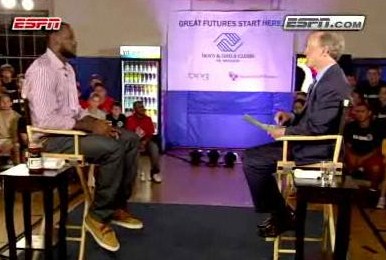
LeBron James announced he was signing with the Miami Heat July 8 in an hourlong program called "The Decision." ESPN let James pick his interviewer, set the guidelines for the program, arrange for all of the ads and give the profits to the Boys & Girls Club. (Credit: ESPN)
LeBron James’s July 8 hourlong program “The Decision” left many journalists wondering about the ethics of the program. In the LeBron Decision program, James announced he would be signing with NBA team Miami Heat.
James picked his interviewer, set the guidelines for the program – including advertising and sponsors, and controlled the profits of the program, which were given to the Boys & Girls Club. The Washington Post reported the program pulled in $2.5 million in advertising.
The AP reported July 11 that “The Decision” was watched by 9.95 million people, “making it the third most-watched program on cable television this year.” In James’s hometown, Cleveland, about one in four homes with televisions watched the program, the AP reported.
Ad Age reported July 7 that sponsors and presenters for the program included The University of Phoenix, Microsoft’s Bing search engine, Coca-Cola’s VitaminWater, McDonald’s, Nike and Coca-Cola’s Sprite.
Sports Business Daily reported July 8 that James’ team suggested the program to ESPN and that the network didn’t pay James.
“The only financial arrangement is that time was made available for LeBron’s camp to bring in sponsors to run spots in the show for the benefit of the Boys & Girls Club,” Sports Business Daily reported that ESPN executive Norby Williamson said. “We have complete editorial control and direction, with the exception of what’s gonna come out of his mouth.”
Williamson is quoted as saying ESPN planned to have James announce his choice in the first 10 to 15 minutes of the program. James picked his interviewer – Jim Gray, a former ESPN reporter and current freelance reporter.
But as The Miami Herald reported, James’s announcement wasn’t made until 9:27 PM. “Gray was widely criticized for asking James 16 questions before asking him which team he would choose.”
Howard Kurtz wrote July 10 for The Washington Post that Gray’s “gentle questioning” of James has also been criticized.
The Statesman reported July 9 that Gray wasn’t paid by ESPN, but that ESPN spokesman Josh Krulewitz reported it paid Gray’s travel expenses and production costs. Gray told The Washington Post he wasn’t paid for the interview by James or James’s representatives.ray told The Washington Post he wasn’t paid for the interview by James or James’s representatives.
The Miami Herald reported July 13 that Mitchell Shapiro, a broadcasting professor at the University of Miami, didn’t have a problem with ESPN’s program. “They’re not doing anything any other organization would not be doing, and donating the money is good public relations,” The Miami Herald reported Shapiro said. “I’m not sure journalism has anything to do with that stuff. That went out the window a long time ago.”
The Miami Herald reported that Williamson said that while ESPN may have set the program up differently than James’s team did, the network, himself included, is “comfortable where we ended up.”
The Houston Chronicle reported July 9 that Bob Thompson, the founding director of the Bleier Center for Television and Popular Culture at Syracuse University was “amazed at the ‘cavalier attitude’ ESPN executives displayed regarding the decision to hand over an hour of airtime to James.”
“Usually when you get hijacked, you don’t give permission for the hijacking to occur,” The Houston Chronicle reported Thompson said. “We have another place where this sort of thing happens, and it’s called an infomercial.
Thompson is quoted as saying “I know ESPN says this is not tantamount to paying for an interview. I think it’s even worse. It’s like paying someone to get an exclusive interview and then letting the (subject) produce the interview.”
Sports Media Society blogged July 8 that the program was basically a LeBron James ad “that was less journalism and more production.”
The Society of Professional Journalists’ code of ethics advises journalists “distinguish news from advertising and shun hybrids that blur the lines between the two,” and “deny favored treatment to advertisers and special interests and resist their pressure to influence news coverage.”
The St. Cloud Times wrote July 13 that the whole LeBron James free agency media circus hurt the credibility of sports journalism, noting the numerous anonymously and vaguely sourced reports about where James would sign.
iMediaEthics wrote July 3 about James’s decision because the numerous anonymously sourced reports didn’t even agree with each other.

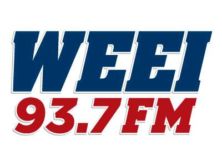

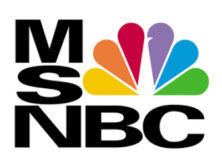

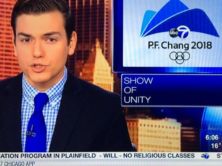
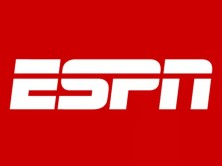
Comments Terms and Conditions